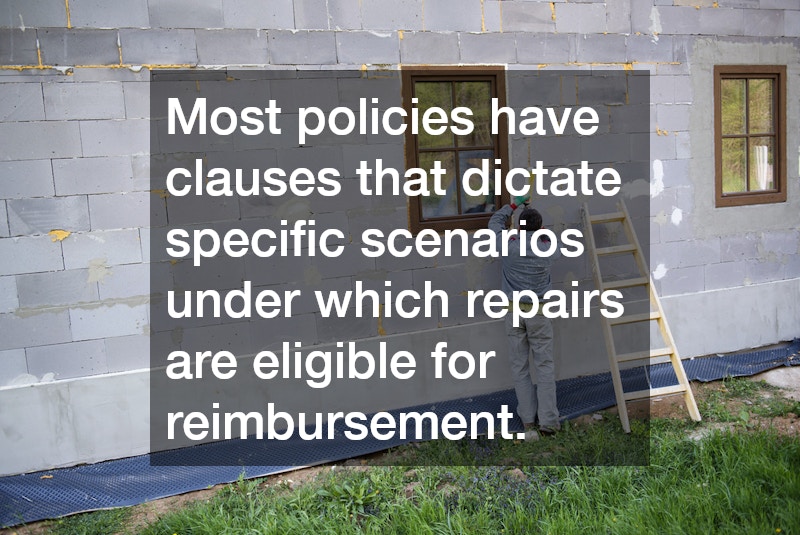Disclaimer: The insurance information provided here is for general knowledge only and does not replace advice from licensed insurance professionals. Please consult a qualified advisor for coverage decisions.
Homeowner’s insurance is a financial safety net designed to protect homeowners from sudden and unexpected events that cause damage to their property. These policies typically cover damage from incidents such as fires, storms, vandalism, and theft. Understanding what is covered can empower homeowners to make informed decisions in their time of need.
While it provides necessary protection, homeowner’s insurance does not cover every type of damage. The specifics of what is reimbursable often depend on the terms of the individual policy.
Knowing the general categories of covered repairs is crucial for managing expectations.
Most policies have clauses that dictate specific scenarios under which repairs are eligible for reimbursement. It’s important for homeowners to differentiate between normal wear and tear and sudden damage. This distinction can significantly impact whether a repair can qualify for a claim.
Fire and Smoke Damage Repairs
One of the core coverage areas of homeowner’s insurance is damage caused by fire and smoke. When a fire occurs, it can wreak havoc on your home’s structure, including the HVAC system. Fortunately, 24/7 HVAC repair services can act quickly to assess and mitigate any damage caused by the fire.
Fire and smoke damage repairs often qualify for reimbursement because they are typically classified as unexpected events. Homeowners must document the incident thoroughly to substantiate their claim. Insurance companies often require evidence of the specific damage linked to the fire to authorize reimbursement.
It’s imperative to have any HVAC systems checked by professionals after a fire. Retaining receipts and detailed invoices from 24/7 HVAC repairs can greatly assist in expediting the claims process. Acting swiftly to repair fire-related damages not only restores comfort but also maximizes the likelihood of insurance reimbursement.
Water Damage Repairs
Water damage is another common issue that homeowner’s insurance often covers. This includes damage resulting from burst pipes, accidental overflows, or severe weather conditions. What it typically does not cover is flood damage, which usually requires a separate flood insurance policy.
Timely intervention is critical when dealing with water-related incidents. 24/7 HVAC repair services are invaluable, as they can address issues such as waterlogged air conditioning systems, which if not treated instantly, can lead to further damage. Insurance claims in such cases usually necessitate a comprehensive inspection and report from the repair service provider.
Documenting water damage immediately and keeping all evidence handy enhances the probability of a successful insurance claim. Engaging with certified repair services assures not only quality repairs but also assists in supplying the necessary documentation that insurance companies demand. Effective communication with insurance agents can also facilitate smooth claim resolutions.
Wind and Hail Damage Repairs
Storms characterized by strong winds and hail can cause substantial damage to homes, warranting repair and sometimes replacement of affected areas. Roofs, windows, and exterior walls are particularly susceptible to this type of damage. Homeowners’ insurance generally extends to such repairs, provided they align with the conditions of the policy.
If the storm impacts your HVAC system, arranging a 24/7 HVAC repair can be a prudent decision. Quick response repairs reduce the chances of long-term damage to critical home systems. When claiming insurance for wind and hail repairs, evidence of the specific event and its impact is essential.
Insurance companies often send adjusters to assess the damage before approving claims, so the more documentation you have, the better. Comprehensive records of repairs, including those for HVAC systems, can streamline this process. Professional repair companies often provide detailed reports that can serve as valuable evidence when filing your claim.
Mold Remediation
Mold can manifest as an insidious side effect of water damage and poses serious health risks. While growing in hidden corners of the house, it can lead to extensive repair needs if left unchecked. Some homeowner’s insurance policies may cover mold remediation, particularly if the mold is a result of a covered peril, such as a burst pipe or storm damage.
To qualify for reimbursement, homeowners typically need to prove that the mold growth stems from a covered cause. Engaging professional services for inspection and documentation is crucial. Such intervention emphasizes both the extent and origins of mold damage, strengthening insurance claims.
Professional repair companies can assist in identifying the cause of mold and providing a remediation plan. They often coordinate directly with insurance adjusters to ensure claims align with underwriting stipulations. Effective mold control not only safeguards health but also protects the insured property’s value.
If you are a homeowner, it’s essential to understand what your homeowner’s insurance policy does and doesn’t cover. This list covers the essentials that your policy may cover. Reach out to your insurance company to find out more specific details about your policy.
.

